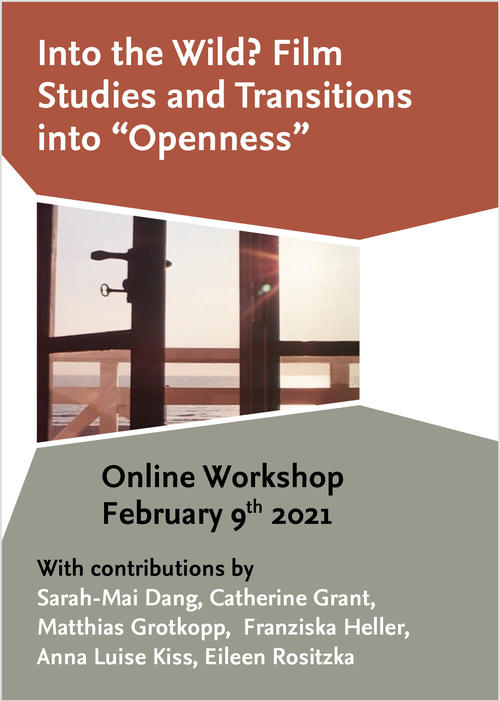Into the Wild? Film Studies and Transitions into "Openness"
09.02.2020 | Digitaler Workshop der Kolleg-Forschungsgruppe Cinepoetics mit Sarah-Mai Dang, Catherine Grant, Franziska Heller und Anna Luise Kiss.
Research Focus: Digital Material and Essayistic Method
This workshop aimed at discussing current developments in open scholarship by presenting various approaches by film and media studies scholars. The topics included problems of data management, evaluation, and visualization, as well as the interrelation between academic text and audiovisual material. An overarching question of the workshop was to identify and discuss numerous ways in which science could be made more publicly available, by focusing on criteria such as accessibility, approachability, reliability, translatability, sustainability, and affordability.
In the first presentation of the day, "Film Studies for Free (Open Access Journals since 2008) – a 'Historical' Perspective," Catherine Grant outlined the development of digital open access film and media studies. By tracing the impact of the growing availability of digital academic resources along the lines of her own scholarly and experimental work, she explored the new global dimensions of exchange made possible by different digital open access formats. Reflections on her site Film Studies for Free lead Grant to explore new methods of online curation, bridging the gap between film criticism and scholarly work. As a pioneer of academic video essays, she was then able to link these affordances of digital formats to an artistic practice that explores new ways of generating and mediating scientific knowledge via the nexus of the audiovisual and the textual.
In her talk, "Plural Publishing: Preprint, Postprint, and Blog Posts in Film and Media Studies," Sarah-Mai Dang laid out the benefits of different stages in the workflow of digital academic publishing. Focusing on the characteristics of preprints as opposed to the more highly regarded postprints and finalized published versions of texts, she emphasized this format’s unique opportunities for academic research. As well as being faster and more cost-efficient to publish, preprints foster a culture of dynamic exchange, in which failures and experiments are not prohibited but encouraged. Dang went on to highlight the benefits of a digital preprint culture that encourages more open formats of academic publishing, invites the participation of younger researchers, and embraces the situatedness of all knowledge.
Franziska Heller's presentation "Open Access?! Publishing Monographs and Academic Traditions in Film and Media Studies" discussed the considerations, challenges, and problems of open access publication based on the experience of publishing her habilitation as an open access monograph. She explored the interwoven dimensions of open access, e-publications, politics, traditions, structure, form, and content that influence both the publishing process and the reading habits in film and media studies. Based on these reflections, Heller went on to underline the importance of a critical stance taken up by scholars towards dispositifs of openness with the imperative to transfer this stance onto the level of the individual text.
Further illuminating the challenges faced by scholars in working with open access publishing, Eileen Rositzka's contribution "Writing with Audiovisual Images – Requirements and Challenges for OA Publishing in Film Studies" examined the impact of digital publishing formats on the interrelation between written text and audiovisual images. She thereby identified the emergence of a transitional state that has taken hold in the act of writing about and writing with moving images. Several examples of different publication strategies, using macro/micro diagrams, stills, and timelines, were examined as points of reflection on the possibilities and obstacles of formatting intermedial correlations in digital film studies publications.
In his presentation "Open Data and Data Management – Publishing Annotation Data of Large Audiovisual Corpora," Matthias Grotkopp outlined possible parameters for establishing a digital research infrastructure that ensures the accessibility of audiovisual annotation data. Exemplified by the work of the Audiovisual Poetics of Affect, he touched on the challenges of developing a systematic analytical vocabulary for large film and video corpora. In this context, questions of automatization, visualization, and manageability were individually examined and then collectively embedded in the broader idea of creating an open data ecosystem accessible to a wider research audience.
For the last presentation of the workshop, "Film Studies as a Predestined Field for Citizen Research and Participatory Research," Anna Luise Kiss introduced her ventures into the field of citizen research. Understood as a guiding principle based on the idea of a common production of knowledge, this research method was discussed as a way of fostering active engagement in the search for collective insights, while familiarizing a broader audience with the tools of academic research. Kiss underlined the importance of creating new questions and new directions of study to allow for new ways of generating knowledge and to open up the academic field to unexpected forms of interactions with the public. This impulse was then taken up in an open discussion about the current state and insufficiencies of traditional forms of publication.
